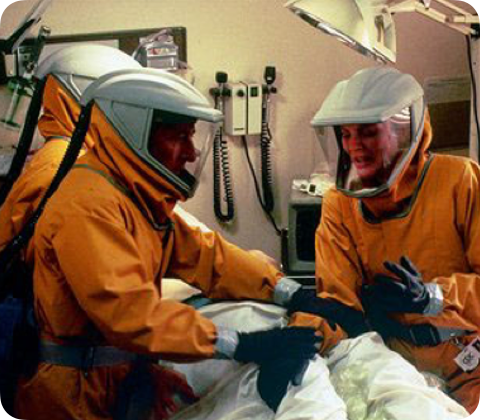About
The history of innovation over the past century boils down to atoms, bits, and genes. Humanity has developed more and more powerful tools that manipulate matter, information, and life itself. These developments underpin everything from your iPhone to mRNA COVID-19 vaccines.
Our cofounders realized there was an opportunity to combine advances in epidemiology and computer science to build a platform for running realistic simulations of human populations, simulations that reveal crucial points of leverage where a single decision can make an extraordinary impact.
What if CEOs could test the implications of competing strategies before committing to one of them? What if lawmakers could compare the specific consequences of different policies under consideration? What if you could model possible futures in order to choose the best path forward? Epistemix gives you the tools to answer these questions in silicon before implementing them in reality.
At the end of the day, that’s what we’re all about: Using technology to increase your ability to make change happen in a complex, noisy world.
Our Origins
-
On a virus-hunting expedition deep in the Congo Basin, Don Burke, boots covered in mud and feces, figured there must be a better way for epidemiologists and government decision-makers to use data to prepare for infectious disease epidemics.

-
When he returned to Walter Reed to lead infectious disease research for the military, Don attended a conference on mathematical modeling and complex systems that led him to team up with John Grefenstette at the Navy Center for Applied Research in Artificial Intelligence to bring that vision to life.

-
With funding from the National Institutes of Health and the Bill & Melinda Gates Foundation, they built a software platform that unlocked the power of computer simulation for public health and established MIDAS—a global network of researchers and practitioners dedicated to modeling infectious disease—resulting in numerous papers in leading journals and collaborations with preeminent data scientists.

-
Leveraging synthetic data, advanced computing, and an understanding of complex social systems, Don and John saw the potential to use the platform to simulate how ideas, trends, and behaviors spread through human populations—informing high-stakes decisions with unique insights.

-
Realizing they needed to scale the platform’s impact beyond its academic origins, Don recruited John Cordier to build a company to put this tool into the hands of those who seek to solve complex social and economic problems, building a better future along the way.

Our Founders
Donald S. Burke, MD
President
After earning his BA in Chemistry at Case Western and his MD and medical residencies at Harvard, Don spent 23 years at the Walter Reed Army Institute of Research where he developed diagnostic tests and vaccines for hepatitis A, dengue, HIV, and other diseases of global importance. Retiring at the rank of Colonel, he moved to academia to become a professor at the Johns Hopkins Bloomberg School of Public Health where he led research and teaching on vaccines and computational epidemiology.
In 2006, he was recruited to become Dean of the Graduate School of Public Health at the University of Pittsburgh (Pitt) where he was responsible for leading 170 faculty and 650 graduate students, with an annual budget of $100 million per year. As Dean he launched a unique program on computational modeling and simulation of public health dynamics that led to the creation of the FRED platform and founding of Epistemix.
In 2019 Don stepped down as Dean and is now the Jonas Salk Chair in Population Health. He has authored over 300 scientific papers and is a member of the National Academy of Medicine.
John Grefenstette, PhD
Chief Technology Officer
John is a computer scientist who has devoted his career to problems at the interface of biology and computation. He has extensive experience in leading highly productive computational science teams, including serving as Head of the Machine Learning Section at the U.S. Naval Research Laboratory, as Chair of Bioinformatics and Computational Biology at George Mason University, and as Director of the Public Health Dynamics Laboratory (PHDL) in the Graduate School of Public Health at Pitt.
He has published over 100 research articles on topics including genetic algorithms, machine learning, intelligent robotics, bioinformatics, databases, high-performance computing, visualization, and simulation models of population health in top-tier journals like Science, the New England Journal of Medicine, Machine Learning, and the Journal of Artificial Intelligence Research, and his work has been featured publications like the Wall Street Journal, the New York Times, Scientific American, and IEEE Expert.
In 2010, John was honored with the Evolutionary Computation Pioneer Award from the IEEE Computational Intelligence Society. He continues to contribute to Pitt as a professor of health policy and management and a senior scientist at PHDL.
John Cordier
Chief Executive Officer
John is a graduate of the Pitt School of Public Health and Joseph M. Katz Graduate School of Business where he received his MBA and MHA degrees. As a graduate student, he joined the team at PHDL to investigate opportunities for commercializing the FRED modeling platform. When customers began demanding the solutions the platform provides, he spun Epistemix out of the university and is now leading its transition from lab to market.
A native of Erie, PA, he received BS and BA degrees from Pitt while on a collegiate athletic scholarship and pursued a career in professional soccer.
John also founded a nonprofit to improve community health through a platform that addresses local health disparities and is an adjunct professor in health policy and management.